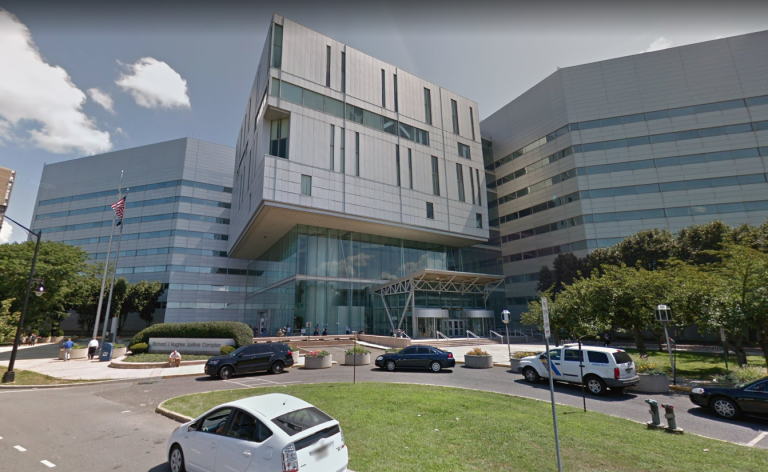Top N.J. court: Question on defendant’s immigration status ‘improper’
The N.J. Supreme Court ruled Thursday that attorneys cannot ask about the immigration status of a defendant in order to attack his or her credibility.

The Supreme Court of New Jersey, at the Richard J. Hughes Justice Complex in Trenton, NJ. (Google Maps)
The N.J. Supreme Court ruled Thursday that attorneys cannot ask about the immigration status of a defendant simply to attack his or her credibility, noting the “inflammatory nature of the issue” may prejudice a jury.
Federal immigration status often has nothing to do with the criminal charges a defendant would face in state court, which would make it irrelevant to the case, criminal defense and immigration attorneys said.
On top of that, knowing someone accused of a crime is not living in the U.S. legally may cause jurors to develop a biased view of the defendant as a law-breaker, said Chief Justice Stuart Rabner in a unanimous opinion.
The decision came out of an appeal by Alexis Sanchez-Medina, who was convicted of sexually assaulting four North Jersey women over the course of a month in 2012. Sanchez-Medina was sentenced to 18 ½ years in prison.
At trial, the prosecutor asked Sanchez-Medina if he came to the U.S illegally. Over the objections of his defense attorney, the judge allowed the question, and the Honduran native admitted that he was undocumented.
The state Supreme Court found that it was “improper” for the prosecutor to have asked Sanchez-Medina about his immigration status because it had nothing to do with the sexual assault charges he faced.
“Both today and in late 2013 when this trial took place, evidence of a defendant’s undocumented immigration status could appeal to prejudice, inflame certain jurors, and distract them from their proper role in the justice system: to evaluate relevant evidence fairly and objectively,” Rabner wrote in the opinion.
The justices also ruled that the trial judge failed to properly instruct the jury about how to weigh eyewitness testimony, which is subject to the whims of human memory and should be “scrutinized carefully,” according to the state’s model jury instruction. Although four women testified at trial, only one was able to identify Sanchez-Medina as her attacker.
The court said it was ordering a new trial for Sanchez-Medina because of the cumulative impact of both errors.
New Jersey attorneys applauded the ruling, which they said was consistent with the rules of evidence meant to keep a jury focused on the specific facts of a case.
“The state has to try them for the crime that they’re being charged with — in this case, sexual assault — not to try them again for the fact that they may have violated federal immigration law,” said Ronald Chen, co-dean of Rutgers Law School. Chen also argued the friend-of-the-court brief submitted by the ACLU on behalf of Sanchez-Medina.
Although the trial judge warned the jury against concluding that Sanchez-Medina flouted the rules of society because he was an undocumented immigrant, the justices noted that the judge never told jurors that they couldn’t use the admission to make a judgment about Sanchez-Medina’s credibility.
The justices also noted in their opinion that there could be limited circumstances when attorneys would be allowed ask about a defendant’s or witness’ immigration status, including if a person were given favorable immigration treatment for their testimony. But those circumstances are rare, Rabner said.
Derek DeCosmo, an immigration attorney based in Camden, said the justices made the right decision. He said allowing the federal civil matter of immigration status into a state criminal trial creates an uneven playing field for undocumented defendants, who are entitled to a fair trial.
“The idea that if someone entered the U.S. without status, that that shows some pattern of behavior, that they don’t follow the rules of society and therefore, must have committed the offense for which they’re currently charged,” said DeCosmo, “that type of rationale is a complete stretch.”
WHYY is your source for fact-based, in-depth journalism and information. As a nonprofit organization, we rely on financial support from readers like you. Please give today.




